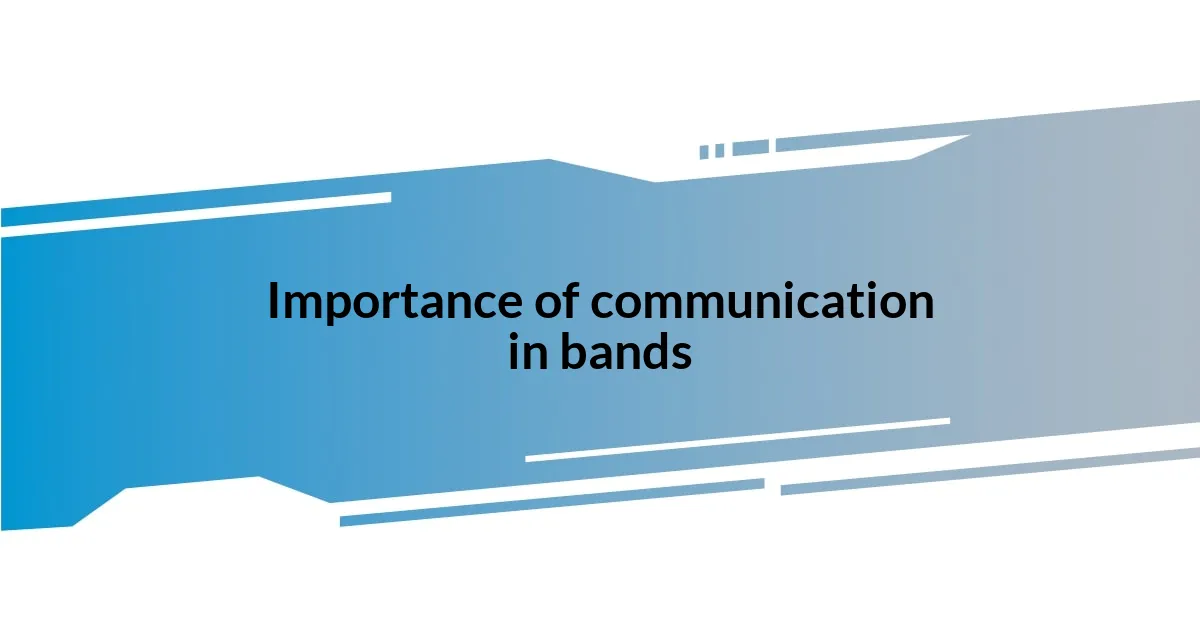Key takeaways:
- Band dynamics require balance, trust, and open communication to ensure that every member’s voice is heard and valued.
- Emotional support and understanding personal struggles can strengthen relationships and enhance creativity within the group.
- Establishing shared goals and regular bonding activities fosters commitment and unity among band members.
- Effective conflict resolution strategies, such as open discussions and timely communication, can transform potential disputes into opportunities for growth.

Understanding band dynamics
Band dynamics are a fascinating mixture of personalities, perspectives, and practices that come together to create something truly unique. From my experience, I’ve seen how different energies can either clash or harmonize. I once played in a group where the frontman had a dominating presence, which often overshadowed quieter members. This dynamic taught me the importance of balance—everyone’s voice deserves to be heard to cultivate a supportive environment.
I often wonder, what truly makes a band cohesive? It’s not just about musical skills; it’s about trust and understanding each other’s strengths and weaknesses. In one of my bands, after we had a tough rehearsal filled with arguments, we gathered afterward to talk things through. That open conversation transformed our approach, allowing us to appreciate each member’s contributions more deeply. It revealed how crucial vulnerability and openness are to fostering a healthy band dynamic.
When I reflect on the various bands I’ve been a part of, I realize that adaptability plays a pivotal role. There were times when the creative process felt stuck because of differing visions. However, when we started embracing each other’s ideas rather than resisting them, the magic truly happened. In my experience, learning to navigate these dynamics can lead to greater creativity and more profound connections between members, enhancing both the musical output and the personal relationships at play.

Factors affecting band relationships
The emotional landscape of a band can significantly influence relationships among its members. I remember being part of a trio where one member was going through a tough time emotionally. It was fascinating—and a bit challenging—to see how his moods could affect our practice sessions. Sometimes, we ended up creating the most heartfelt music together, but other times, the tension would be palpable, showcasing how crucial it is to support one another during personal struggles. Recognizing and empathizing with each other’s feelings fosters a deeper bond, allowing creativity to flourish despite life’s ups and downs.
Another factor is communication. In a previous band, we often brushed over important discussions, which led to misunderstandings and built-up frustrations. I recall one rehearsal when we all got quiet after an unintentional jab about song choices. Afterward, we spent an hour just talking, and it hit me how vital it is to express thoughts openly. This experience reinforced my belief that words can be as powerful as music; when shared genuinely, they enhance connections and prevent the resentment that can sour relationships.
Lastly, I’ve found that shared goals and ambitions can either pull a band together or tear it apart. In one of my collaborations, we had members who were on different pages regarding our musical path. I distinctly recall our first big performance when someone dropped the ball because they didn’t align with our mission. That moment was a wake-up call for us all about the importance of having a unified vision. When everyone is committed to a common goal, it feels like magic happens, both personally and creatively.
| Factor | Description |
|---|---|
| Emotional Support | Band members must empathize with each other’s personal struggles to maintain harmony and strengthen bonds. |
| Communication | Open and honest dialogue is essential to prevent misunderstandings and nurture relationships. |
| Shared Goals | A unified vision fosters collaboration, enhancing creativity and reinforcing connections within the group. |

Importance of communication in bands
Effective communication in a band is pivotal for maintaining harmony and creativity. I recall a time when I was in a band that struggled with conflicting ideas during songwriting sessions. Instead of letting frustrations fester, we dedicated one rehearsal to sharing our feelings about the music and our roles. By simply articulating our thoughts, we discovered a productive balance that transformed our collaborative process—and our songs became richer as a result.
- It fosters trust: Being able to express concerns openly builds the foundational trust necessary for a successful band dynamic.
- It encourages feedback: Regular communication allows for constructive criticism, helping musicians grow individually and as a group.
- It resolves conflicts: Addressing misunderstandings promptly prevents them from escalating and souring relationships within the band.
- It enhances creativity: Conversations about ideas and visions lead to unexpected musical explorations and innovations.
In my experience, understanding each other’s perspectives opens doors to collaboration that may have previously felt closed. I remember a moment when a bandmate shared an idea that initially felt outside my comfort zone. Instead of dismissing it, I encouraged a discussion, and we found a way to blend our sounds in a way we’d never anticipated. Those discussions, where each member feels free to express their views, are where the magic happens. It’s during these moments that you realize communication is not just about exchanging words—it’s about crafting an environment conducive to creativity and connection.

Conflict resolution strategies for bands
Conflicts in bands are inevitable, but what matters most is how we approach resolution. I remember a particular situation where two bandmates had a fallout over a song arrangement. Rather than allowing tension to simmer, we held a dedicated session to unpack the disagreement openly. During this discussion, I realized that sometimes just listening can diffuse a situation more effectively than any solution. It’s powerful to foster an atmosphere where everyone feels their voice is heard; it can turn a potential rift into an opportunity for growth.
Another effective strategy is to establish clear guidelines for how we handle disagreements. I once played with a band that had a simple yet powerful rule: we addressed issues within 24 hours. This discipline kept grievances from becoming overwhelming and allowed us to face disagreements while the feelings were fresh. I found that having a timeline can feel liberating. It discouraged passive-aggressive behaviors, allowing us to pivot discussions from blame to understanding and collaboration.
Lastly, creating moments for team-building outside of the music can significantly help in conflict resolution. One time, after a heated rehearsal, we decided to spend an afternoon just hanging out, sharing laughs and stories. I discovered that those light-hearted moments often bring back the essence of why we started making music together in the first place. When we share our quirks and passions beyond the band, it builds a foundation of trust and camaraderie that’s invaluable when conflicts arise. How can we expect to resolve issues if we don’t truly know one another?

Tips for enhancing band cohesion
To enhance band cohesion, one effective approach is to schedule regular bonding activities. I once organized a casual game night for my band members, and it turned out to be a game changer. Sharing laughs over board games opened new avenues for connection that our rehearsals just didn’t provide. Isn’t it remarkable how stepping away from the music can actually bring us closer together?
Another important tip is to establish shared goals. In one of my previous bands, we created a vision board that illustrated our aspirations—everything from album releases to touring plans. This visual representation not only united us in purpose but also sparked discussions about each member’s dreams. When everyone feels invested in a common journey, motivation and commitment naturally deepen.
Lastly, practicing appreciation openly can dramatically enhance cohesion. I remember a time when I took a moment during rehearsal to express gratitude for my bandmate’s unique contributions. The shift in atmosphere was palpable, and soon, everyone began sharing their appreciation for one another. Hasn’t your spirit lifted when you’ve been acknowledged for your efforts? Recognizing each other’s hard work nurtures positivity and fosters a supportive environment that’s essential for any successful band.